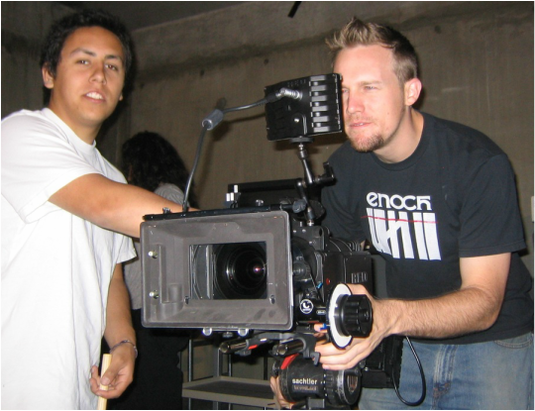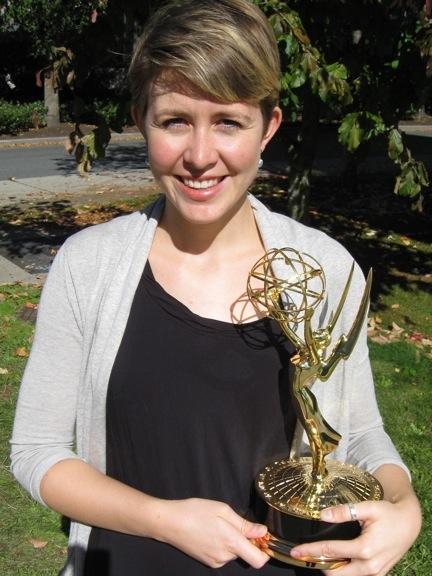|
New
Former students: Rob Witt, on left: winner of the CamerImage award for Best Cinematography for Kendric Lamar's VMA-winning video "Alright", and Joel Pincosy, winner of 9 Film Festivals as a Director. On the right, Jody Martinson: Winner of the National Emmy Award for Best Documentary. Our next class is a Master Class in: |
Click to set custom HTML
|
Producing & Directing for Feature Films, Streaming Assets, Music Videos, YouTube videos and New Age Commercials
A "7-Saturdays Intensive" starting on Saturday March 30th, 2024, in Berkeley,
and, Yes! there is still room in this class. Just give us a call at (510) 387-2153 and we can add you in.
The full course syllabus is on the lower part of this page, just scroll down and you will see the details of each of the 7 Saturdays. Here is the course description:
Producing & Directing for Motion Pictures and Streaming:
The Top 100 Things you really need to know, to Produce & Direct your own films.
This class is aimed at those of you who would like to Produce & Direct your own Low Budget Features, Streaming Television shows, YouTube Assets, Commercials, Music Videos, narrative-documentaries and more. The syllabus for the class is outlined in full below: just scroll down. Class will be conducted "Live" in Berkeley
Class is limited to 12 students, for a very high-touch, very individually-tailored feature film and streaming assets "intro to production" experience. Classes are from 10am to 5pm. And Yes, There is still room in this class.
The course Syllabus is below, just scroll down.
Cost of the Class is $500 via Zelle, or Cash.
Our Track Record:
Our Berkeley Film School was recently rated by The Wrap magazine, in Hollywood, as the 20th Best Film School in the United States, and Number One in Northern California, based upon input from 500 film industry professionals in Los Angeles.
Here is the link to the rating: www.thewrap.com/top-50-film-schools-ranked/
Students who have taken this course have been admitted to the Undergraduate and Master's Degree Programs at USC, UCLA, NYU, Columbia, The American Film Institute and The School of Visual Arts in New York, have won multiple film festivals with their films, and are currently working in hundreds of film industry, television, and streaming industry-related jobs in the US.
Graduates of this instructor include world-famous music video directors Colin Tilley & Chris Milk, ASC cinematographer Joseph Labisi, Producer Ryan Sage at NBC/Universal, Editor Craig Alpert (Deadpool 2, Pitch Perfect 2 & 3), and Jodie Martinson (pictured above, winner of The National Emmy for documentary) & many more industry-successful students.
The Class:
This class will use our proprietary techniques for Producing and Directing for Motion Pictures, Streaming Assets, Festival-Level Shorts, Music Videos, Commercials, and Social Media streaming, to help you create world-class work.
We call it "The First 100 Authentic Priorities you need to know to Produce and Direct your own feature films."
It works in 5 main modules to enable you to Produce and Direct your own work.
The 5 modules are: 1. The Research, Development and Writing Process: Script
2. The Nuts and Bolts of Producing and Directing Infrastructure: Real World
3. Storyboarding from your Locations and Rehearsals: Pre-Coverage Shot List
4. Cinematography and Lighting for Producers and Directors: Coverage.
5. The Preproduction weeks; Day of Production; and Editing Processes.
The price of our 7-Saturdays Intensive is $ 500. Paid via Zelle, PayPal or cash
We invite you to give us a call, or text us, ASAP to discuss how you can control your future, write your own narrative, and bend the future of your own Destiny.
Please call or text (510) 387-2153 and / or visit our website at cylfilm.weebly.com to read the more than 30 positive reviews about this class, and how it has changed people's lives.
The Secret of Controlling your own Destiny is Producing and Directing your own work. There is nothing to be afraid of. Call us. We absolutely answer the phones on weekends. Call anytime between 9 am and 9 pm.
We are still the Number One rated Narrative Film School in Northern California
Our class Syllabus is below. Please take a look & give us a call at (510) 387-2153 to chat or enroll. And Yes! We really do answer calls on weekends.
|
Course Syllabus This Intensive is designed to help bring you immediately up to speed about the current state of the art in Producing and Directing for Low Budget Features, "High Television" (HBO/Showtime/Netflix), Festival Shorts, Music Videos and Commercials. We call it "The First 100 Things you Need to Know to Produce and Direct your film; the first 100 Authentic Priorities." It works in 4 main modules to enable you to Produce and Direct your own work, and therefore, have more control your own destiny in the business. The 4 modules are: The Nuts and Bolts of Producing and Directing, Cinematography for Directors and Producers, Screenwriting at the Los Angeles level, and the Preproduction; Production; and Editing Process. The classes will cover everything you need to know to prepare and to complete one small film, including all of these elements: The conceptual-, visionary-, and intellectual property development of the script; The nuts-and-bolts of line producing and directing on set; The art of acquiring locations; Auditioning for, casting; and rehearsing actors; The role of the Director and Producer in the cinematography of the film; Controlling the edit during post production; Finding the target investor/film festival for the asset; and How to use YouTube and social media tools in the promotion of the asset. This class is also designed to accommodate people who have had no prior formal film education; it assumes and requires no prior knowledge and begins from square one. Classes will be conducted from 10 am to 5 pm, on Sundays, and will emulate a total immersion in the "Los Angeles" style of feature film and "high television" content creation. Our students have had their first films accepted in over 100 film festivals, and have won 11 of those. We are very proud of them. Producing and Directing 1 Vision 1.0 Class Description This class will look inside the mind of producers and directors, and explore the process of the creation of a major motion picture from the first thousandth of a second of inspiration and insight, through the creation of: "The Vision Thing: The Inception and Development" of the original Idea; The key concept: "Trusting Your Intuition and Your Worldview" in the pre production and script development phases; The concept of "Surrounding Yourself with Your Influences" during the early on development phase; The concept of "Surrounding Yourself with Your Loved Ones" during all of the phases of production and how to bring out the best in your team; Pre production and production processes of " Finding Locations, Selecting a Team and a Cast, how to to Control a Crew and a Cast"; and "How to Call the Shots in the Post Production phase". Essentially, the class will attempt to provide insight into when to retain complete control on a production, and when to surrender to the larger production process and the team around you. Your Learning Outcomes: By the end of this course, you will be able to do basic pre-production, production, and post-production of a single 3 minute narrative asset, and able to Audition, Cast, Rehearse and Direct actors in a narrative fiction setting. And be able to shoot "coverage" in the traditional Hollywood style, matching the film industry’s expectations for traditional long form and short form narrative camera coverage. A Typical Class is composed of the following elements: One to two hours of Directing and/or Producing: New Material. One to two hours of Critique of ongoing projects. 1.1 The First Class: Orientation to Producing and Directing 1 Introductions Course Overview Stories 1.2 The Vision Thing: Role of the Director on a Feature: What does a director actually do? The Vision Thing: The Inception of the Idea Trusting Your Intuition and Your Worldview Surrounding Yourself with Your Influences Surrounding Yourself with Your Loved Ones How Does a Director Develop a Script, Find Locations, Select a Team and Control a Crew and a Cast? And How Does a Director call the shots in Post Production? 1.3 Story Structure What makes a great film? Why do people go to films? Which films get discovered? Why are the major studios always wrong on audience? Pitch Session 1: 2 hours Students pitch 3 ideas for a 3 to 5 page narrative.. One is selected to move forward for development as Project One. 1.4 Securing a Location / Locations Protocols How to find locations and how to secure them. Permits/Our Insurance Policy. Etiquette/Fees. Pitch Session 2: Ideas Selected for First Draft Finalized. 1.5 Casting Level 1 Casting Call Protocols at CYL Films. Where to find actors in the Bay Area, and how to treat them. Analysis of “organic blocking”: Rehearsing in the Location Space. Blocking in rehearsal, and blocking on location. 1.6 Coverage 1: The Frame: Shot size and Framing Coverage of two people seated: Framing one shot Positive and Negative Space Composition: From Left to Right Shot Size and Meaning Headroom and Margin The Concept of Dynamic Headroom Producing and Directing your Crew 1 Directing: Discuss Crew positions and responsibilities 1.0 Producing: The Pre-Production Meeting Environment 1.7 Coverage 2: Matching: Script Analysis for “Pairs of Shots” Dialogue scenes in Features are shot in “Pairs of Shots” Coverage of “The 180 Degree Rule” The “Axis of Intimacy” and “The Eye Plane” The “First shot” choice: The Beauty Shot Choosing a side to begin on: Awareness of your Background Matching Angles Matching Eye Levels Matching Lens Matching Heights Matching Distance Matching Composition Matching Backgrounds Matching Lighting Lens choice: “The Sweet Spot” Camera Distance to subject Depth of Field as an artistic choice Foreground, Midground, and Background planes Continue discussion and viewing of examples from Lecture 1.2 The Reaction Shot 1.0: The Eyes are the Window to The Soul All shot choices are driven by script intensity and physicality Matching hands, props and action The Art Direction of your Background Matching Background/Atmosphere for continuity Foreground, Midground, and Background: Crossing Action: Thickening the shot Producing and Directing your Crew 2 Directing: Discuss Crew positions and responsibilities 2.0 Producing: The Production Meeting Environment The Work of Current Directors These are some of the films and television clips which will be shown as examples: Apocalypse Now Blackhawk Down Closer Fight Club Generation Kill Glengarry Glen Ross Juno Kill Bill 1 and 2 Lord of the Rings 1, 2, and 3 Mad Men Memento My So Called Life Pulp Fiction Reservoir Dogs Rodger Dodger Schindler’s List Seven Shakespeare in Love Sin City Up in the Air |


